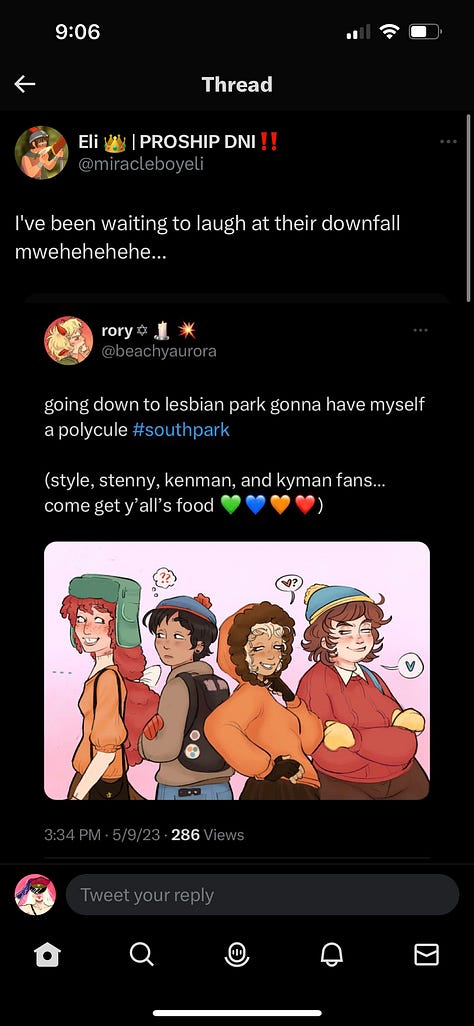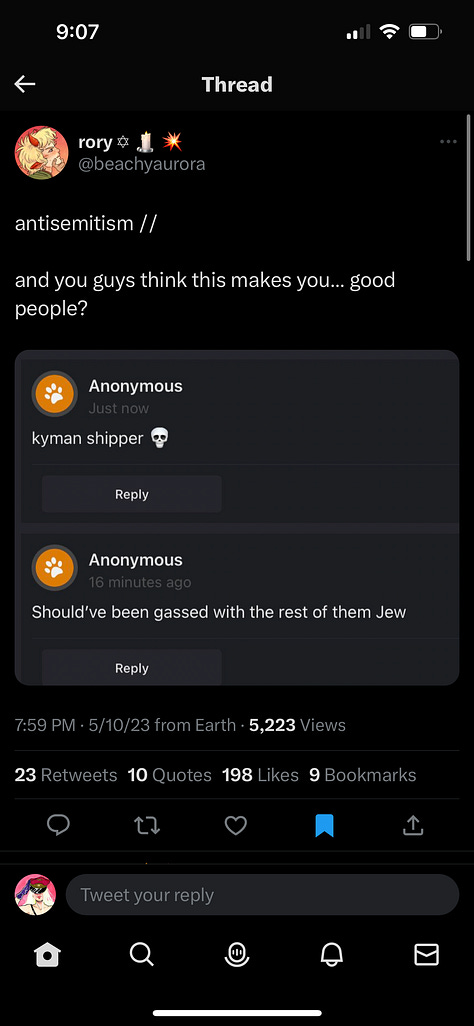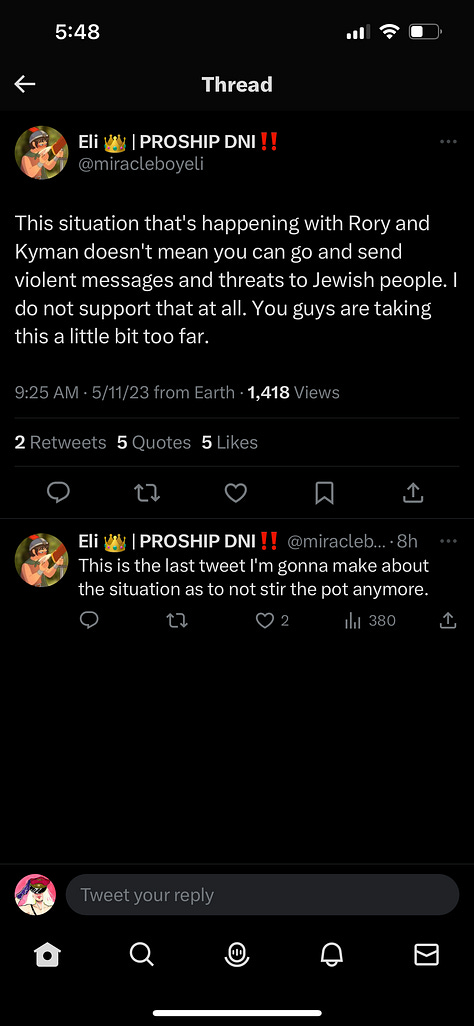As April Rosenblum states in her widely-propagated and hard-hitting pamphlet about antisemitism in Leftist movements and spaces: “The Left has long procrastinated on taking on anti-Jewish oppression.” She goes on to mention that one of the reasons we have is because it looks different. Many people in Leftist spaces, including fandom, have ignored that antisemitism is still rampant not just on the Right but in their own groups as well, staying silent when someone jokes about some conspiracy or formulates works based primarily on an antisemitic trope (some of which are so ingrained that it’s difficult to point them out sometimes). Antisemitism didn’t simply go away after the Holocaust and it did not become something that we can simply put on the shelves of history as though it would never happen again. There’s something my mother once told me as a child that has always stuck with me: Those who want you to forget the Holocaust happened are those who wish to perpetrate another. Despite that America has, for many years, been a relative safe-haven for Jewish communities, the undercurrents of aggression and hatred toward individuals and Jewish spaces are strong and getting stronger every day. If the Left isn’t willing to stand up for their Jewish members when they are directly or indirectly targeted by antisemitic tropes, conspiracy, or just blatant hate-speech, it is to crumble from the very foundations.
One of the issues with antisemitism and with a lot of racial issues is the common inability for people to identify what is antisemitism and what is just plain old hurt feelings. Criticizing Israel’s actions against Palestine is not and never was antisemitism even if the leaders of Israel want everyone to believe that it is. This is how one gets Republicans co-opting Israel as their “pet” issue simply to weaponize the word “antisemitism” against Leftists who know that what is happening to Palestinians is wrong. In a fandom context: writing fiction based in World War II which happens to mention or somehow feature Nazis or the Holocaust is unlikely to be antisemitic unless it contains tropes or a thematic conspiracy-driven plot line intending to (or unintentionally) casting Jewish peoples as the true evil. Hurting Jewish feelings is not antisemitic. Perpetuating and/or committing to antisemitism is antisemitic…and in some cases it’s pretty easily discerned while others, not so much.
Examples of antisemitism in fiction:
Blood Libel. Famously antisemitic children’s author Roald Dahl’s story “The Witches” was criticized heavily for its portrayal of women but was nearly passed-over for the hidden antisemitism, these “witches” being secret demons living in disguise who wish to kill children, wearing gloves to disguise “claws” and sporting large nostrils by which they sniff out children. They also have a “secret society” of witches and a “grand” leader. The 2020 film based on the book featured witches who looked particularly “goblin-esque” with huge pointed noses, an extremely common antisemitic trope that was often seen in Third Reich propaganda.
The “Greedy Jew” stereotype which arose from the church having banned Christians from collecting interest on loans from other Christians, leaving Jewish business folk as the primary money-lenders. Later on, Jewish peoples were ultimately “forced” into the role of banker as they were often explicitly excluded from the guild systems of other professions. Examples of entire races being defined by their “greed” such as JK Rowling’s goblins and No Man’s Sky’s aromatic little Gek creatures are still being invented, originating from these pervasive stereotypes of not just Jewish “greed” but also Jewish “supremacy” (the Gek being a great example of this as they are shown to be the victors in a war with the Vy’keen).
“New World Order” tropes in science fiction and fantasy can very easily fall into this trap, the general idea of this that there is a secret organization seeking to take over the world (or the universe) using subversive means to install a totalitarian government. Usually this is run by the “elite” in whatever fictional society, a placeholder for Jewish stereotypes. Sometimes the Jewish stereotype is not an “elite” but still holds antisemitic stereotyping, such as JK Rowling’s goblins who control the banking in the wizarding world but are subjugated by witches and wizards by being disallowed the usage of wands along with other elements of oppression. Instead of subverting these tropes and allowing for an understanding of the goblins’ plight, the new Hogwarts Legacy game instead merely plays into the “evil” of goblins and the player character is obligated to put down this “rebellion,” relegating goblins back to their initial state—the greedy big-nosed bankers whose place in the wizarding world bears a strong resemblance to how Jews were treated in societies throughout history.
The issue with antisemitism in fandom is very much just like the issue of racism in fandom: fandom is largely transformative and draws upon the thematic choices of the media from which it is drawn. If your source material has, ingrained within it, antisemitic tropes, it is very likely that the bulk of the fandom works which draw from it are going to mirror those tropes. The sheer amount of licensed, stamped, and widely approved works that contain antisemitic stereotypes, tropes, and themes is staggering and once you’re able to identify those, you begin to see them all over the place not only in older works that were made in a time you might expect such a thing, but in modern creations as well.
But what happens if you don’t know? Well, if you don’t know: you don’t know. It’s not the end of the world if your fic has an antisemitic trope and you weren’t aware of it. When you become aware of it, it might deserve some reworking. Though the original media it came from might uphold thematic antisemitism, it’s up to you as an individual how you choose to handle that in your work.
But what about truly awful blatant antisemitism in fandom spaces? Stuff that makes you realize that someone doesn’t have to lie about it to prove that it’s there? From solitary comments on CuriousCat to the more widespread discourses like PAWG Patrol’s insistence that Anne Frank benefited from White Privilege, antisemitism is fairly noticeable woven in between not just anti-shipper spaces but proshipper spaces as well, factoring into some of the harassment that Twitter user Tom (AKA Mouse) has experienced during several schisms in proship communities along with blatant transphobia and other such aggressions. The Alt-Right’s ability to infiltrate niche spaces to drive wedges between marginalized communities, pitting Black fans against Jewish fans or Asian fans, is insidious and the progressives within such spaces seem entirely unable to resist the draw of that pugilistic feedback loop of righteousness.
Sometimes the obsession of being “righteous” in Leftist spaces overtakes logic. For instance, recently in the South Park fandom, Twitter artist beachyaurora (Rory) who is ostensibly Jewish (sporting a six-pointed star in sea’s username) posted an alternate universe version of the four main characters, Kenny, Stan, Kyle, and Cartman. The show itself is shocking, featuring plenty of blatant antisemitic jokes usually at the Jewish character Kyle’s expense and most times perpetrated by the irreverent edgelord character of Cartman. It’s for this reason that a lot of anti-Kyman (Kyle/Cartman) shippers utilize the argument that the ship itself is antisemitic—but what happens when a Jewish person ships Kyman or is ambivalent to the ship? Well…unfortunately, in protecting a bunch of moving paper cut-outs arranged to look like a person from antisemitism, fans decided to be…antisemitic. Twitter user miracleboyeli QRT’d the “offending” polycule post by Rory and claimed that they had been looking forward to sea’s “downfall” which of course then spurred a deluge of hate to Rory’s page, including antisemitic statements Eli condemned.



It’s very important in these scenarios to make certain that what you’re doing is perpetrating the least amount of harm as possible. Sometimes you’re gonna accidentally include a deeply-ingrained antisemitic trope in your work because you just didn’t know—this is the importance of education and learning and growing and not letting small missteps here and there stop you from trying. It’s not the end of the world if you fuck up, but it’s important that we’re doing our best here because if we’re not, we’re giving free license for sickos like this to continue their open and overt hatred of Jewish communities in our spaces. What’s the ultimate goal here is making sure that you can tell the difference between writing a story that’s “tasteless” and writing a story that’s openly perpetuating antisemitism. Pay attention when you’re world-building in sci-fi and fantasy genres, keep all of this in mind when you’re writing in historical contexts—don’t shy away from portraying antisemitism and definitely don’t shy away from making waves here and there…just do your best to be a better ancestor. Not just for BIPOC but for our Jewish friends as well.
And for god’s sake: Don’t let people speak to Jewish folks this way without your voice screaming back. As we head steadily forward to the Holocaust’s 100 years mark we must be ever vigilant now more than ever. Do not let them do this. Do not let them obfuscate what antisemitism is and what it means—learn what it looks like and learn what it doesn’t look like.
You don’t have to lie about it to see it in fandom. It’s there. No reaching required.



